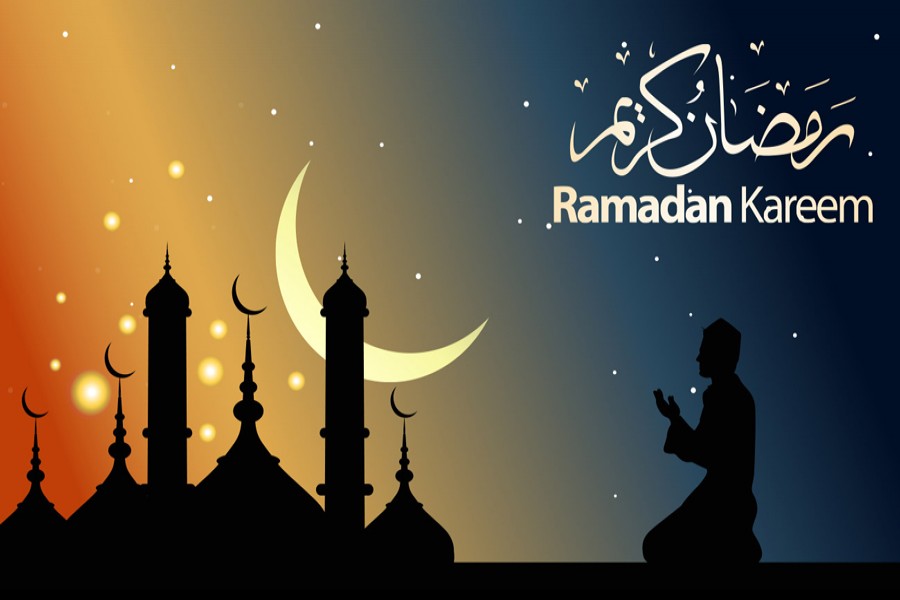Ramadan is here. In this blessed month, most Muslims if not all, spend the daylight hours fasting completely. They abstain from having any food or drink and indulging in other physical needs during the daylight hours. But refraining from food and drink is only the bare minimum requirement. What follows is even more significant. It is time for reflection about spiritual recharging, positive behaviour and soul searching. It is time to raise the community's social awareness, bury all differences, forget and forgive and renew both human and spiritual relationships. Fasting in the month of Ramadan is obligatory for the healthy adult Muslims. But when one is genuinely sick and fasting might make the medical condition of an individual far worse, Islam exempts him or her from fasting. Therefore, if you are unable to fast due to chronic illness, there is no need to feel guilty. You may make a donation to charity in lieu of fasting. The amount should be sufficient to feed one person a day. For each fasting day that is missed. In addition to that, you can say additional prayers like reading the Qur'an, inviting friends and family for evening meals called 'iftar' and donating to charity.
One of the most meaningful aspects of Ramadan is the bond that one shares with the family and the community. It brings families and entire communities together. While usually we might be busy with our individual lives and may not share a meal for days at a time, it is perhaps the only time of the year where the whole family sit together every single day for a month to have iftar and also wake up at the same time in early morning to have sehri together. They do it every day for a month. Many invite their neighbours and friends to share their iftar. Many mosques and Islamic centres offer iftar, where people gather to break their fast with other people in the community. Taraweeh (night prayers) in the holy month is also a great moment as people get to see their friends and family every day. That not only creates contentment, but also builds strong relationships with families and community members.
The objective of fasting is not that one merely abstains from the material and physical things, Muslims are also instructed to refrain from unlawful and improper conduct such as lying, fighting, backbiting, arguing, cheating or deceit, etc. and thus discipline one's self. Fasting is also viewed as a way to empathise with the needy and those who are less fortunate. It makes us aware of the sufferings of the poor who don't have a place to live in or the means to feed themselves. It also reminds us of the importance of appreciating what we have and how blessed we are. It thus develops our feelings for those who go through hardship everyday in their lives. Moreover, in this month, a fasting person is expected to be more charitable and generous towards others, and seek a closer connection with the Creator through additional prayer and reading the Quran. It is a time to renew our unique human qualities by making extra efforts to do good deeds. In this way, the month of Ramadan gives us an opportunity to practise self-discipline and self-control and develop good habits that help us move forward.
Charity and social justice are two important components of Islam. During Ramadan, Muslims are encouraged to remember those who are weak and vulnerable, who have no choice of their own and go hungry and thirsty each day of the year. There are two forms of charity in Islam-obligatory and voluntary, called "Zakat" and "Sadaqah" respectively. Zakat is obligatory for those who are financially able and the giver is believed to be purified through the act of transferring wealth to the poor. Zakat is an individual's obligation. But if the collection and payment of zakat and Sadaqah are done under a collective planning, rather than paying it individually, it can have a great impact on socio-economic condition of our society.
For nearly 50 million people in rural Bangladesh, access to education, health care, clean drinking water and sanitation remains a distant dream. If the zakat and Sadaqah can be utilised through social welfare projects rather than individual contributions, it can improve livelihood and help reduce poverty. For example, if disbursements are made to those projects that promote development and self-sufficiency, such as providing scholarships for the children in deprived communities, building educational and vocational training centres for children, building a community clinic or hospital, installing deep tubewells and sanitary latrines in rural areas so that villagers have access to clean and safe water and safe sanitation, it will bring about a revolution in poverty alleviation and economic development. Of course, we may also provide direct cash support to those who are not capable of working and finding means of survival. But the best way is to contribute to the zakat and Sadaqah funds that become resources for running income generating activities that can support the livelihood of the recipients. A country like ours must have a good and effective management of zakat so that it can play a greater role in reducing poverty and inequalities in the society.
It would be so unfair if we do not mention the numerous health benefits of Ramadan. According to the American Physiological Society, fasting improves insulin sensitivity, speeds up the metabolism, improves the brain function and immune system and gives the digestive system a break and allows the body to get detoxified. Indeed, the benefits of the month of Ramadan are multidimensional. In addition to fasting, prayer and charity, it contributes to the overall principle of making the individual more humane, more considerate and generally a more responsible member of society. And not only it bridges the gap between the created and the Creator, but also allows us to think that we are connected with the entirety of humanity.
Email: [email protected]


